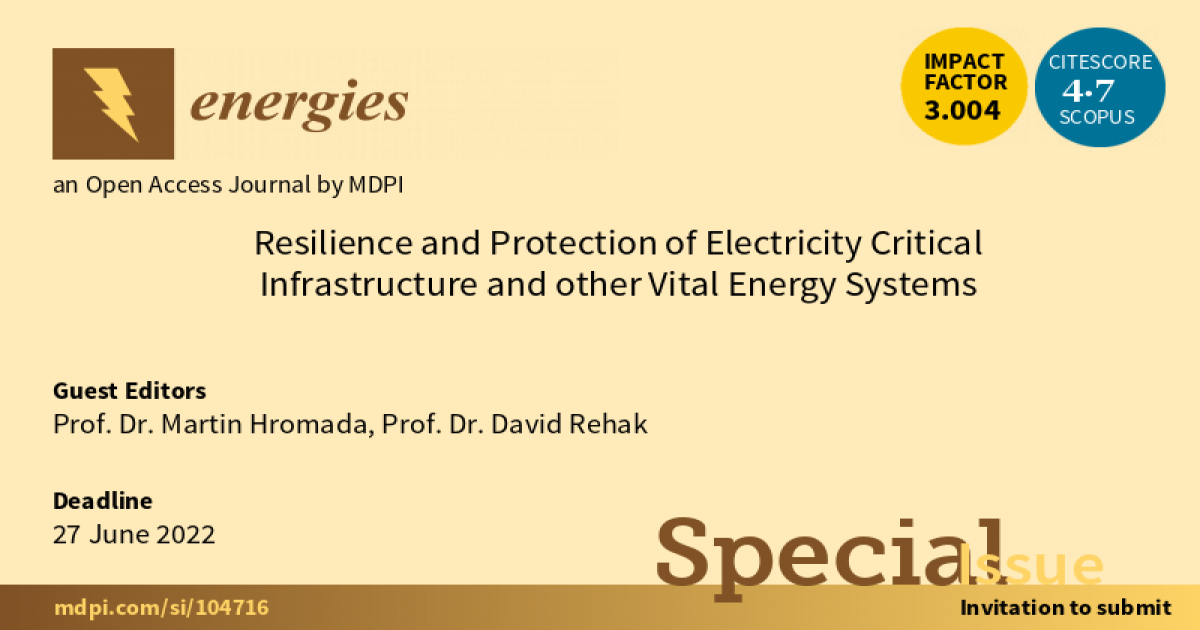- 3.2Impact Factor
- 7.3CiteScore
- 17 daysTime to First Decision
Resilience and Protection of Electricity Critical Infrastructure and Other Vital Energy Systems
This special issue belongs to the section “F4: Critical Energy Infrastructure“.
Special Issue Information
Dear Colleagues,
In terms of extent and scope of services provided, electricity is one of the most important sectors of European and national critical infrastructure. Due to the network nature of the critical infrastructure, the supply of other vital functions of the society depends on a stable and resilient supply of electricity. Extensive disruption of these supplies, related cascading and synergistic effects therefore have negative effects not only on basic human needs, but also on the economy and security of the state. For this reason, it is essential that a strategic approaches and the interest of all Member States ensure comprehensive and integrated protection of electricity critical infrastructure elements and the permanent strengthening of their resilience.
Based on the above, the aim of this special issue is to publish original articles and approaches focused on Resilience and Protection of Electricity Critical Infrastructure and other Vital Energy Systems. Resilience is not only perceived in the context of critical infrastructure as the ability to reduce the magnitude and/or duration of disruptive events. The effectiveness of a resilient infrastructure or enterprise depends upon its ability to anticipate, absorb, adapt to, and/or rapidly recover from a potentially disruptive event. Vital energy systems are those energy systems (i.e. energy resources, infrastructures, technologies and uses linked together by energy flows) that support critical social functions.
Within this special issue, interdisciplinary contributions focusing on the resilience and protection of critical infrastructure elements and vital energy systems are welcome and required. These contributions can be based not only on engineering disciplines and approaches, but also on disciplines such as management, sociology, ecology, political science, psychology, urban science, geography and economics.
Prof. Dr. Martin Hromada
Prof. Dr. David Rehak
Guest Editors
Manuscript Submission Information
Manuscripts should be submitted online at www.mdpi.com by registering and logging in to this website. Once you are registered, click here to go to the submission form. Manuscripts can be submitted until the deadline. All submissions that pass pre-check are peer-reviewed. Accepted papers will be published continuously in the journal (as soon as accepted) and will be listed together on the special issue website. Research articles, review articles as well as short communications are invited. For planned papers, a title and short abstract (about 250 words) can be sent to the Editorial Office for assessment.
Submitted manuscripts should not have been published previously, nor be under consideration for publication elsewhere (except conference proceedings papers). All manuscripts are thoroughly refereed through a single-blind peer-review process. A guide for authors and other relevant information for submission of manuscripts is available on the Instructions for Authors page. Energies is an international peer-reviewed open access semimonthly journal published by MDPI.
Please visit the Instructions for Authors page before submitting a manuscript. The Article Processing Charge (APC) for publication in this open access journal is 2600 CHF (Swiss Francs). Submitted papers should be well formatted and use good English. Authors may use MDPI's English editing service prior to publication or during author revisions.
Keywords
- critical infrastructure
- electricity
- vital energy systems
- resilience
- protection

Benefits of Publishing in a Special Issue
- Ease of navigation: Grouping papers by topic helps scholars navigate broad scope journals more efficiently.
- Greater discoverability: Special Issues support the reach and impact of scientific research. Articles in Special Issues are more discoverable and cited more frequently.
- Expansion of research network: Special Issues facilitate connections among authors, fostering scientific collaborations.
- External promotion: Articles in Special Issues are often promoted through the journal's social media, increasing their visibility.
- e-Book format: Special Issues with more than 10 articles can be published as dedicated e-books, ensuring wide and rapid dissemination.

